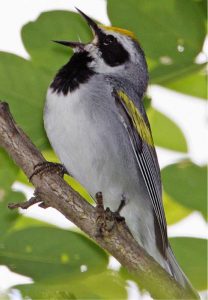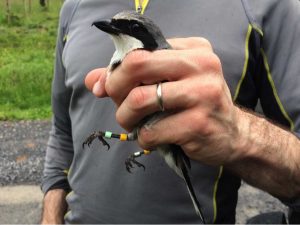
The Golden-winged Warbler uses a variety of early successional habitats for nesting, including old fields and young forests. Photo: George Jett
More than 230 species of birds are found in the Appalachian Mountains Joint Venture boundary during some portion of their life cycle. Of these, the AMJV partnership has identified 70 priority bird species for the Appalachian Mountains Bird Conservation Region (BCR 28), the majority of which are landbirds. These species either breed or winter in the Appalachian region, although a few, such as the Blackpoll Warbler primarily use the Appalachian Mountains as stopover habitat during migration.
The AMJV partnership focuses on bird species in the greatest need of conservation attention. These species typically have limited ranges, small population sizes, declining population trends, or use unique or highly degraded habitats. Additionally, species that have large percentages of their populations within the AMJV region are also considered priorities, but they may not necessarily warrant immediate conservation action.
For example, the American Woodcock and Golden-winged Warbler spend much of their time in young forests and old field succession environments, both of which have decreased in abundance and quality over the last century. We are working with our partners to protect and restore these early successional habitats in key areas through active forest management and restoration practices to benefit these and other priority bird populations, such as the Prairie Warbler and Eastern Whip-poor-will.

Eastern grassland species are also seeing extensive declines, such as this Loggerhead Shrike, which both breeds and winters in the AMJV region. Photo: Rich Bailey
Large blocks of mature deciduous forest also support many of the AMJV’s priority species, such as the Cerulean Warbler and Wood Thrush. The connectivity and condition of mature forests in the Appalachians has also changed drastically over the last century, as a result of invasive species, a reduction in natural disturbance regimes, and an increase in urban and energy development. For example, the Cerulean Warbler prefers large forest blocks that include open canopies with a rich understory and midstory. The AMJV partnership is working to improve forest health and restore the landscape to support a full suite of forest species that depend on everything from high elevation spruce-fir habitat to rich, cove forests.
Click here to view and download the 2023 AMJV Partnership Year in Review!
Read MoreThe 2023 AMJV Impact Report is now available for downloading and sharing! Starting in 2022, this beautiful report has been designed annually by Liz Brewer (AMJV Outreach Specialist) to…
Read Moreby Liz Brewer, AMJV Outreach Specialist Appalachian Mountains Joint Venture (AMJV), in partnership with the National Wild Turkey Federation (NWTF), USDA Natural Resources Conservation Service (USDA-NRCS), and the West Virginia…
Read MoreAppalachian Mountains Joint Venture
1700 Kraft Drive, Suite 1375
Blacksburg, VA 24060
Office: (540) 951-9376
© 2019 Appalachian Mountains Joint Venture Funded by: AMJV Partners Website by Skyhound Internet
